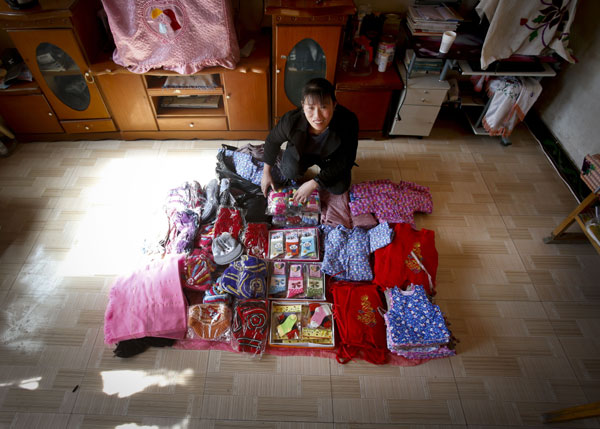Farmers harvest a crop of poetry
Updated: 2012-11-06 09:21
By Peng Yining (China Daily)
|
||||||||
After the accident, he was bed-ridden for several years. Reading and writing became one of few things he could do. In 1987, he published his first story and made 40 yuan.
When an editor called him for more stories, he felt he was useful for the first time in his life.
"Without reading my stories, who would know about a paralyzed person like me?" he said. "When I was first visited by other lovers of literature in my town, I felt like an antique that had finally been excavated after centuries.
"Most of the visitors were also farmers. We talked about our crops, cattle, and, of course, literature," he said.
Yang Xiuqin writes for rural women like herself. Her short novels, mostly romances, are popular with a lot of female readers in Xiji.
 |
|
Yang Xiuqin, 40, writes short novels, mostly romances, when she finishes work at her cloth business every day. |
"In the rural areas, women are not even supposed to go to school, but I want to prove that women should have decent education and can be writers," said the 40-year-old woman.
Her success has encouraged her daughters, 18 and 16, to stay in school, although her husband complains that writing keeps Yang from doing farm work but doesn't bring in more income for the poor family.
"Misunderstanding and disdain are common events for rural writers," said Ma Jianguo, a 43-year-old farmer and construction worker, and the only poet in his village.
|
 |
|
Ma Jianguo, a 43-year-old farmer and construction worker, is the only poet in his village in Xiji county, in Ningxia Hui autonomous region. |
The walls of his living room are covered with his work, mainly classical-style Chinese poetry and aphorisms, written on white paper and marked with his seal.
He has displayed his poems at a May street market in his village every year since 2007. He pastes the papers containing his work on a 2-sq-m piece of hardboard and writes four large characters at the top: Shi Ci Jiao Liu, or Poetry and Phrase Workshop.
"I have no one to talk to about writing. I am so lonely and anxious that I beg for comments, whether they are good or not," he said. "Only a few people stopped by my poetry sign. Most thought I was ridiculous, and some said I was crazy. They asked, 'Why didn't you bake a potato if you had enough time on your hands to write that nonsense?'"
Although he lives in the deserted inland and rarely leaves his village, Ma's work is mostly about life and the fertile environment around Jiangnan, an area on the lower reaches of Yangtze River.
"It needs imagination," he said. "When I look far into the distance, I always imagine that beyond the yellow hills there are rivers, lakes, trees and flowers, just like the place I have always wanted to live."
In the dusky light, Ma curled up by the stove, and his calloused hands opened a notebook on a low table.
"The clear stream holds a lonely boat," he wrote, while the night wind whistled outside and the snow beat against the window.
"Flowers are falling like snow ...,"he continued. The glow from the fire cast his shadow on the walls.
"In poverty-stricken areas, literature can be a strong spiritual force and helps people to survive. Besides, there aren't many other pastimes, so writing is likely to be popular there," said Su Bingpeng, senior editor of Yellow River Literature, a major publication in Ningxia. "But it's hard to make money by writing."
Writers are paid around 30 yuan per 1,000 words, but the rate is falling as the magazine's circulation declines.
"Even it doesn't make money, I still love writing," said Zhang Lian, the poet. "I believe people have the right to enjoy the beauties of nature and literature, even without money or education."
Writing is an impulse deep inside a person's instincts, he said. When he had acute hepatitis at age 10, Zhang's father dragged him 20 km to the hospital on a wooden litter. They were moving along a bumpy country road, which cut through flat, desolate ground, when a gust of wind woke the sick boy with the dust it stirred. At first, he saw the pink-tinged sky on the horizon and then the setting sun reddening the heavens.
"It was sad, but magnificently beautiful," he said. "I had tears in my eyes. That was the moment I knew I wanted to write."
He later recast the scene in the poem This Is Where the World Pulls Down the Curtain.
"You can curse, or escape, when life corners you," he said. "Or, you can write a poem."
Contact the reporter at pengyining@chinadaily.com.cn
`

 Relief reaches isolated village
Relief reaches isolated village
 Rainfall poses new threats to quake-hit region
Rainfall poses new threats to quake-hit region
 Funerals begin for Boston bombing victims
Funerals begin for Boston bombing victims
 Quake takeaway from China's Air Force
Quake takeaway from China's Air Force
 Obama celebrates young inventors at science fair
Obama celebrates young inventors at science fair
 Earth Day marked around the world
Earth Day marked around the world
 Volunteer team helping students find sense of normalcy
Volunteer team helping students find sense of normalcy
 Ethnic groups quick to join rescue efforts
Ethnic groups quick to join rescue efforts
Most Viewed
Editor's Picks

|

|

|

|

|

|
Today's Top News
Health new priority for quake zone
Xi meets US top military officer
Japan's boats driven out of Diaoyu
China mulls online shopping legislation
Bird flu death toll rises to 22
Putin appoints new ambassador to China
Japanese ships blocked from Diaoyu Islands
Inspired by Guan, more Chinese pick up golf
US Weekly

|

|







